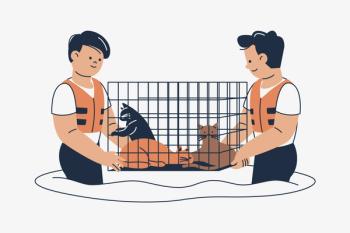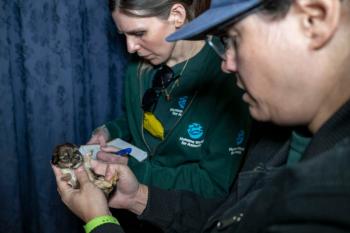
4 ways to help pets with homeless owners
Street Dog Coalition board member Jon Geller, DVM, DABVP, CVJ, shares a few tips for veterinarians interested in providing care for the pets of Americas indigent population.
Kichigin/shutterstock.com
After 20 or so years in practice, Jon Geller, DVM, DABVP, CVJ, told attendees at a recent
Dr. Geller speaks
Dr. Geller has spoken at numerous Fetch dvm360 conferences, from coast to coast.
So he turned to the
“No money changes hands,” Dr. Geller says. That fits Dr. Geller's values.
If you want to dip your toe into so-called “street medicine,” Dr. Geller offered some advice in his overview about current programs, current care provided and the future of helping homeless Americans with pets.
The perpetual challenge? “How effective can we be with the least amount of resources?” Dr. Geller asks.
1. Follow your heart and don't be afraid to help
You should never do anything that makes you feel unsafe or uncomfortable when practicing outside the confines of your hospital, but also don't let fear of liability turn you away from you inner calling to help.
If you're a licensed veterinarian, you've got professional liability insurance and you keep reasonable records of when and how you help in cases, you should be covered, says Dr. Geller.
“You can jump out of your car, and if you have the stuff with you, you could help a pet on the street,” he says.
2. Don't rush
Because of communication gaps, Dr. Geller says some of his free events have had two pet owners and others have hundreds. But calibrate your volunteers' expectations (and your own) about how many pets you can help, because you'll need to take a good history.
Without a lot of diagnostic rule-outs at hand, “you need to talk to people” to get a complete history, he says. That will take a little time per person.
At bigger events, Dr. Geller powers a microscope, because he recognizes “field cytology” can be helpful, but it can be a challenge, too. If you find something at an event that you can't treat, like cancer or an infectious disease, you may not be able to help. Ask yourself with the diagnostics you're doing, what will you do with that information?
3. Ask for help
If you identify a need in your area for free vaccines, free pet food or even pet-friendly housing for shelters, reach out to companies and the distributor reps who represent them. Dr. Geller was able to get cat condos donated to one shelter that helped people who otherwise would have feared leaving pets behind in an abusive home.
Join with an existing nonprofit, or start your own, and “you can get a lot of donated vaccines and volunteers to help you do the work,” Dr. Geller says.
4. Don't give up
Dr. Geller says some motivated veterinarians don't even try to offer street medicine because they're concerned it doesn't meet the standard of care. “AAHA has standards of care. Our hospitals have standards of care. But the standard of care is what another reasonable veterinarian would provide in the same situation,” Dr. Geller said.
“You're trying to minimize adverse outcomes, but there will be more risk involved because you won't have as much information [without hospital diagnostics]. You're making your best guess with your clinical reasoning skills,” he said.
Street medicine is not for everyone. However, if you're called to it like Dr. Geller was, it may be worth your time to find out what small things you could do today, and potentially what big things you could help build tomorrow to further help indigent Americans keep their pets healthy.
Newsletter
From exam room tips to practice management insights, get trusted veterinary news delivered straight to your inbox—subscribe to dvm360.





